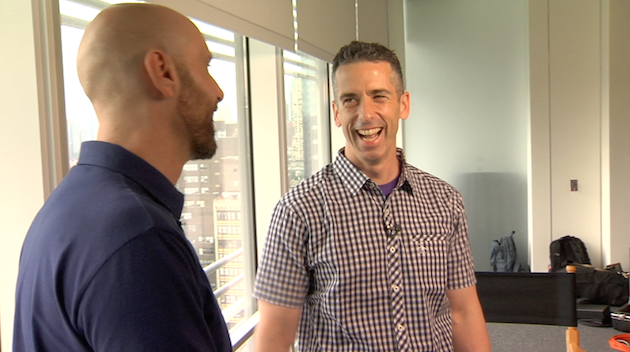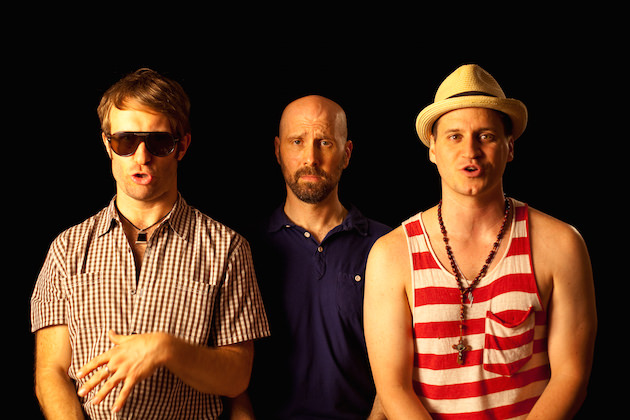Director David Thorpe on his Doc Do I Sound Gay?
Journalist David Thorpe never intended to become a filmmaker. Thorpe was getting his MFA in creative non-fiction with the idea to write a book about his anxiety over his voice, and more to the point, his anxieties over sounding "gay." But Thorpe realized that a book wouldn't do the topic justice, so he dropped out of the program and funneled the money he would have spent on his classes into what would become, four years later, his debut documentary Do I Sound Gay?
While nominally about Thorpe's feelings about his own voice, his four year odyssey and the film that came out of it became about much more than that. Bringing in family and friends, strangers and celebrities, linguists and acting coaches, Thorpe's effort to find out why he sounds the way he does (and how he might change his voice) ultimately led to questions about how we identify ourselves, the things we do to fit in, and where the way we sound actually comes from. If the eyes are a window onto the soul, then Thorpe's documentary reveals that the voice reveals the state of the soul, perhaps more acutely than other facet of our personality.
Do I Sound Gay premieres tonight in New York City at the IFC Theater. I spoke to Thorpe at the Rizoma Festival, held annually in Madrid (and worth planning a trip around), and then again a few days before the premiere. This is an edited transcript of that discussion.
When did this concern about the way your voice sounds begin?
I’ve always been self conscious about my voice, and about sounding gay, because as a kid I was kind of bullied into submission and tried to hide any possible signs of effeminacy. How I feel about my voice is usually tied to how confident I feel about myself. One thing that a lot of people who aren’t LGBT don’t know is that it’s not like you come out and snap your fingers and love who you are. It actually can take a long time to accept yourself. It’s a thing that a lot of us are working on our whole lives, and my voice has always been the symbol of that.
Were you surprised at how your friends reacted to this project?
I was very surprised. Sam, who’s one of my best friends, has struggled to accept his voice almost his whole life, and I never knew it, we'd never actually talked about our lingering pain. In that initial dinner party scene, my friend Alberto says that his dislike of his voice is just part of his generalized self loathing about being gay, and it was such a frank admission. I'm one of his closest friends, and I'd never heard that before. So I do think that the movie is pointing out an elephant in the room, both for gay and straight people. I think part of me was kind of shocked, thinking, ‘Why has no one been talking about this?’ Maybe I could have spared myself 25-years of anxiety.
This anxiety about the way one sounds really seems to touch a lot of people.
Another big surprise for me was hearing David Sedaris say that sometimes he feels good when people think that he’s straight. If someone as successful and beloved as he is still has this kind of lingering desire to not come across as gay, then I don’t have to feel so bad about feeling it myself. I think I had some shame about having shame, you’re supposed to be 'Rah-rah-rah Gay is good,' all the time, and interviewing David and interviewing my friends and lots of other people helped me realize that, Hey, this is something that’s common to us all. We all have perceived flaws or perceived handicaps that hamstring us, but really, other people don’t see them at all. This is meant to be a universal story.

When Dan Savage talks about internalized homophobia, that struck me as something that I think a lot of straight people don’t ever think about, or even know exists. How did you work up the nerve to put yourself at the center of this film and ask yourself, ‘Can I change this part of myself, and should I?’
It was the lightning bolt moment that I depict in the film. I was going to Fire Island and hearing all of these stereotypical gay voices and feeling repelled, and also feeling terrified that I sound like that. I knew then that I had to get to the bottom of these feelings about my voice and resolve them one way or another. Whether it was finding a voice that I felt more comfortable with and felt was more masculine and less gay, or, coming to terms with the reasons that I didn’t like my voice and was finding the “gay” voice repellent, I had to find out. I felt so upside down because I’d worked so hard to come out of the closet, I’d been an activist off and on my whole life, it was like…wait, what's happened here? So my original impulse was just to get to the bottom of those feelings.

As a journalist, I imagine you were well equipped to start that process.
I’ve always done personal writing as a journalist. One time, I wore a wig when I was starting to feel uncomfortable about being bald. I thought maybe I should just wear a wig, maybe I’d be happier. So this is very much in that same vein. When I started the project, I really didn’t know what would happen. Originally I was going to write a book, which is a much more distancing medium. In talking about the story, it became really clear that having me as a guide through the film was the key. I’ve always been a strange combination of courageous and insecure…I felt compelled to tell this story in a way that I’ve never felt before. I felt compelled to get back in touch with a part of myself that didn’t care what other people thought, whether that was a decision to sound less gay or whether that was a decision to accept how I did sound.
In a couple of scenes you’re really getting a good bit of shit from people, especially your old high school friend, who cops to feeling like you changed your voice completely and said it sounded like a put-on—what was that experience like?
My friend who said to me, ‘You’re an imposter,’ that was both a really painful moment and also really liberating moment for me. It was painful because I wanted to say, ‘Screw you, how dare you judge me like that? To think that my whole personality is some kind of pretentious posture aimed at provoking you.’ But another part of me really understood where she was coming from, because I was having trouble embracing my voice, and I didn’t know what my real voice was. Sometimes I did feel like an imposter…I didn’t know why I queened out sometimes, or why I butched it up other times. So in some ways it was really liberating to hear someone say, ‘Yes, I don’t like your voice,’ because that was my big fear. I thought it was really brave of her to be honest.
She seemed to be experiencing these feelings in the present tense—where do you think her feelings of being somehow duped by your "new" voice come from?
I think where it really comes from is wishing that I had been able to come out in high school and that she had been able to support me, because we were very, very close. Sometimes when you come out to someone that you’re close to, they feel betrayed. And they don’t think about how hard it must have been for you. When you’re the one coming out, you’re like, ‘Okay, this is not about you right now.’ Initially with my parents it was the same thing, it was complicated and sort of about how I was upsetting their lives. It was a different time, and I’m very close to my parents now. When people don’t know how to deal with someone coming out, it sometimes manifests itself in, ‘How could you do this to me? How could you change? You weren’t being honest with me.’ And the whole point of coming out is that you’re struggling to tell them this.
Your film also deals with the science behind the way we speak, and the linguists you speak to reveal some pretty surprising facts, things like “code switching” and “covering,” which we all do, and has nothing to do with sexuality at all…
Every time I did an interview with a voice coach or a linguist, they broke down the components of my voice, or talked about the possible origins of why some people sound gay, it felt like being let out of prison. This had been such a big anxiety for me, and I was just as surprised as other people are when they watch some of the scenes that talk about the theories where the gay voice comes from.
And they're pretty clear on the fact that there is no such thing as a gay voice.
The 'gay voice' is just shorthand for the stereotype of the gay voice. There is no such thing as a fundamentally gay voice. There’s no voice that every gay man has, or is limited to gay men. In the film you see there’s a straight guy who sounds 'gay,' so I always like to really stress that I want to make it clear that there’s no such thing as a gay voice, there’s just men who, to a greater or lesser extent, sound stereotypically gay, which is stereotypically effeminate. For some men the so-called stereotype is the reality.
You have not only iconic gay men like David Sedaris, George Takei, Tim Gunn and Dan Savage weighing in on this topic, but you also have straight people like Margaret Cho and Don Lemon talking about the ways in which they were insecure about their voices.
It was really important for me to include Margaret Cho and Don Lemon talking about their anxieties about sounding Korean or sounding black or sounding southern, because this self consciousness is not limited to LGBT people. Ultimately my voice, Margaret’s voice, Don’s voice, they're symbols of how we feel about ourselves. If Margaret Cho as a teenager wants to fit in and be cool, she’s going to have anxiety about looking Korean, sounding Korean, eating Korean food. We all make these little tweaks to our image to smooth the wheels a little bit for our daily life. One of my questions is, ‘Why are we tweaking who we are?’
How do you feel about the next generation of LGBT kids—are you hopeful they'll have it bit easier than you did growing up, considering the Supreme Court decision on gay marriage and the swiftly changing attitude of Americans in general?
It’s been such a radical shift in the way people perceive gender, because that’s what we’re really talking about in terms of voice and self expression. When things like the Supreme Court decision legalizing same sex marriage happen, it’s a immeasurable leap forward in terms of assimilating the people into the mainstream. Unfortunately, sexism and misogyny are really deeply rooted in our culture, so it’s not like that’s going to disappear over night, but I do hope these big leaps forward are going to trickle down to the school yard, to parents who might reject their kids for being gay, or trans. Young people today still face a lot of challenges about being who they are. I think this generation is that transitional generation where they are realizing that they don’t have to conform to these rigid types.



